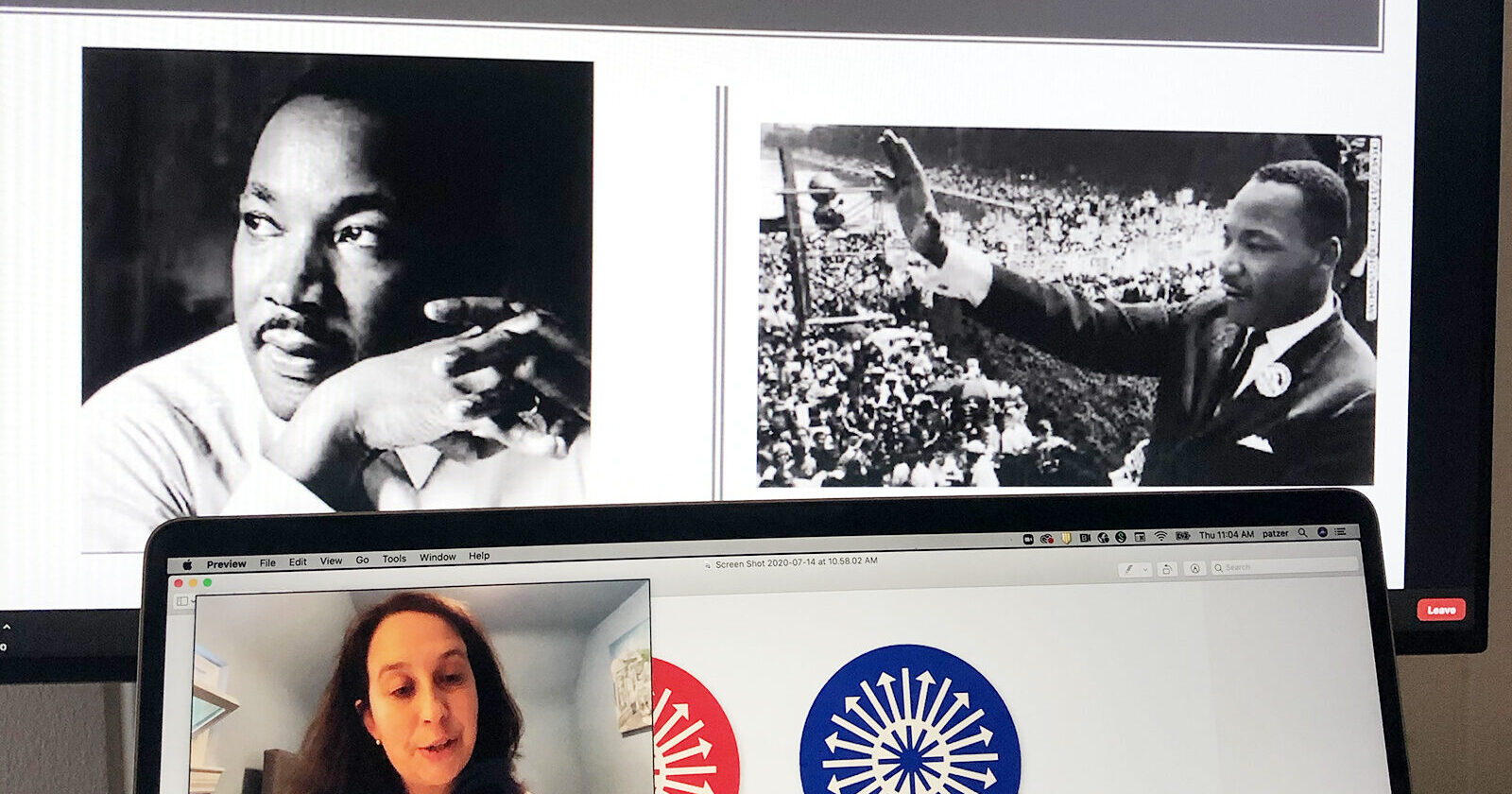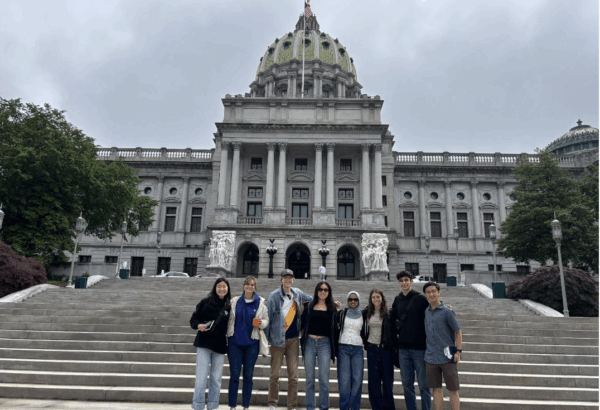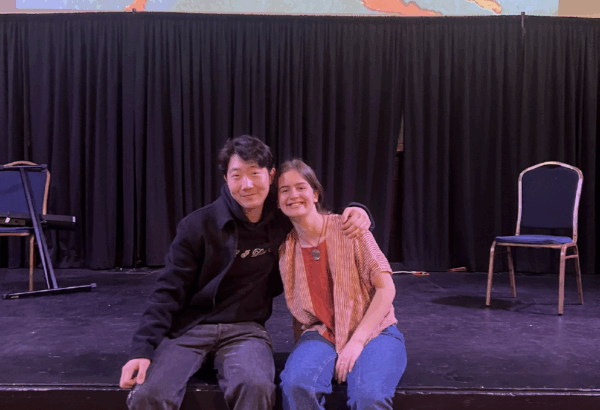How did you come up with the idea for this preceptorial?
Dr. Howard: The idea for a preceptorial on contemplative social movements, to be quite honest, started this summer with the killing of George Floyd and the Black Lives Matter movement. All of the different peaceful protests that mobilized around the city of Philadelphia, all over the country, and even throughout the world, made me think about past social movements. Whether it was the Civil Rights movement or the movement around freedom and liberation in India, or different economic movements headed up by Dorothy Day or Cesar Chavez. It made me look back at these past movements, and think about what was motivating those moments, and how this moment compared.
In looking at those other movements, I thought there are some things we could learn, perspective we could gain, that could speak to today. Many times, in the news they actively compared, for example, what was happening in Philadelphia with Black Lives Matter and the different peaceful protests with the Civil Rights movement. To be honest, there was more mobilization in Philadelphia, maybe the largest protest, that Philadelphia has ever seen. So, the media was doing it a bit already, but it made me really think about what are the values and things that animate that period and animate today.
You mention the first amendment in the preceptorial. You outline that people usually reference the first amendment as freedom of speech, but don’t point out the second half of the amendment, the “right to or the right of the people peaceably to assemble, and to petition the Government for a redress of grievances.” Why do you think the first part of the amendment gets more attention than the second part?
Dr. Howard: It’s a really great question. For some reason I think it is because the press calls it out more; freedom of speech and freedom of the press, those parts of the amendment are talked about a lot. To be honest though, the very first line of the first amendment concerning that we don’t have an established religion and there’s free exercise, those two clauses are not talked about as much as they should, because we do not in our country have an established religion and that should be discussed more than it is. But also, as you’ve mentioned, we do not talk enough about the last part of this amendment, the right of the people to peaceably assemble and to petition the government for a redress of grievances, and when people don’t know that it is written into the constitution, they think it can be spun by this current administration or news as what’s going on is wrong, the fact that people would protest that kind of disruption is wrong when in actuality, it’s written into the very fabric of our nation.
I teach Introduction to American Politics, and one of the things we talk about when discussing the constitution, is the very original debate between federalists and anti-federalists. The federalists wanted a constitution. They won so we hear their side of the story always. But the anti-federalists, their voice is still very important, and their voice is what’s still reflected in the bill of rights, of which the first amendment is the first in the bill of rights. The anti-federalists’ biggest fear was that the national government would grow too strong and that the states, and the localities, and the rights of the individual would be overshadowed by a very large national government. These rights get written into the first amendment. And what’s really important is the first amendment encapsulates some of the anti-federalists greatest fear— that the government would not allow for these types of things. It provides for, again the first few lines are that “Congress shall make no law,” (congress is not allowed to squelch the rights of individuals) to freely exercise their religion, of course it’s interpreted in many ways throughout case law, but to squelch the rights of individuals to practice religion, to peacefully assemble and to petition the government. Think back to the Boston Tea Party or other moments of disruption, and that is very much in the fiber, the anti-authority-ness of our first amendment is very much American and very much the way we see ourselves, it’s how we balance individual rights and liberties with a national government. Whenever I see or hear the press, or again the government itself, casting dispersion on people peaceably protesting, I get a little nervous and I want to make sure that people know the full first amendment and not how it’s typically thought of as solely freedom of speech and the press, but also these other very important components of it.
Kaitlyn Hendrickson: Yes, I definitely think it’s important for people to remember that, especially when the media right now is maybe misrepresenting what is going on with the protest and kind of muddling it with the more violent instances or expressions of pain. So, I appreciate you bringing up the fact that it is written into the fiber of our country. If people are going to be focused on the constitutional rights they need to remember that aspect as well.
Dr. Lia Howard: It’s patriotic to protest right? That bumper sticker is right on, because it’s in our constitution.
Can you walk us through contemplative practice? In the preceptorial, you connect contemplative practices with social movements seamlessly, can you reiterate the connection there and why it’s important?
Dr. Lia Howard: Again, we’re facing this current moment of political protest during a pandemic, so we’ve been thinking of wellness in terms of our physical wellness, staying safe, and social distancing which are all very good things and very important. But we need to be paying equal attention to our mental and social health, and our mental health requires so many different things in the age of zoom meetings, and not being around people, and not being able to do the regular routines of the things that give you joy, and peace, and health, and not being able to relax with people as much. In the preceptorial I tried to emphasize the importance of integration, meaning that our personal health, our individual health, and the health of our community are connected. This is an important part of the Paideia initiative, is seeing with both eyes, how the individual is doing and how the community is doing. Contemplative practice built into social wellness is something that I think we as a culture need to be thinking about more.
Throughout the preceptorial, we did several contemplative practices: we did a deep breathing exercise, we did something called beholding or, in other traditions it’s called visio-divina or holy seeing, where we looked at a painting and talked about perspective and then we ended with some reflection, which is also very important for wellness. But the reason I think it’s so important is that when we just do social movements or we just do social justice, without time to reflect or spend time on wellness we actually become disintegrated, our mind and our heart don’t get the chance to knit themselves together, and we already are facing disintegration right now. It’s disintegrating, in many ways, to see people on a screen and not spend enough time with other people, we need to go out of our way to do things that are wellness oriented and bring us back together, knit the pieces back together and this is one. Part of this, looking at past social movements, and looking at people like Gandhi, Martin Luther King Jr., Dorothy Day, and Cesar Chavez, who are the people we focused on in the preceptorial, those folks had a deep sense of values and they had their own contemplative practices that they brought to their work and they actively were integrating themselves in wellness ways. I read from a book about Martin Luther King, I read about his fears, this moment that he talked about with his biographers about deep fear he was having, he was getting bomb threats and people were shooting at his house and all sorts of real scary things, and he spent a time of deep prayer and he audibly heard something that gave him the courage to do the social movement he was going to do the next day, he was going to lead that march, to do that next protest and sit-in and be jailed. So that moment of contemplation gave him the vision, the passion, the strength, to do the next thing and I think we can get burnt out if we spent too much time doing external things for the community and not spending time on the inside. They’re both deeply at play, because I also think that Martin Luther King’s values spurred him to get involved in the first place, so the internal spoke to the external but the external can benefit from the internal.
We are seeing mass protest across the United States right now in the Black Lives Matter movement. Why is contemplative social practice relevant to the contemporary moment?
Dr. Lia Howard: I think it’s worth saying again that because we’re in a pandemic, there are new challenges that past movements didn’t face, and the new challenge is that we have social distancing but we also are all at home, so in a way we all were tuned into this moment. I mean Black Lives Matter has been going on since Trayvon Martin’s killing and yet it hasn’t had the mass mobilization, especially around white America, until this moment and so I think the fact that we are all at home has given more passion and it’s mobilized more people, so this moment is very unique in that way. Because Paideia is Greek, I’ll say this, the word apocalypse, which has been going around a lot right now with the fires, and the storms, and this horrible COVID-19, it means an uncovering or a revealing in Greek. So, what it’s done is uncovered and revealed some of the deep structural inequities like structural racism, economic inequities, and other things. You can’t ignore them right now, they’re all on the table and we’re all experiencing them, so I think right now contemplative practice becomes even more important at the same time because we feel so raw, and it feels so uncomfortable, and we feel so, maybe, isolated or angry. The current divisive political moment is not helping, we hear messaging that is deeply harmful to the person and to our hearts, and so again we need integration more than ever right now. To kind of marry the desire for social change with this moment to integrate, reflect, breathe, work inside a little bit, there could not be a more drumroll moment that says we need to do this now, I think.
Kaitlyn Hendrickson: I think it’s important to take some time to take a step back and check in with yourself, especially when you are participating in something that is so emotionally charged. If you’re not good with yourself if you’re not good emotionally you’re not really going to do anything productive or helpful for that movement.
Dr. Lia Howard: And we also lost representative John Lewis, a devastating loss, and this caused us to look at his life. He was a man who was so battered by others and yet he remained non-violent. I think the example of John Lewis is so important because he clearly had a deeply integrated sense of self that he could be in a non-violent social movement even when other people were attacking him. I don’t think you can respond peacefully to other people hitting your body unless you yourself have been deeply integrated and spend some time in contemplation with your values.
What would be your advice for someone interested in participating in a social movement?
Dr. Lia Howard: I think we have a wealth of people, heroes, to look back on, and I think right now, just because of this moment being so hard, sometimes it’s hard to find individuals in this moment to look to but looking back, you can read about people’s lives and be inspired. To be honest, I heard this on a recent podcast where it was Ezra Klein speaking to Ta-Nehisi Coates, and I think he was saying that actually spending time to read about non-violence as a philosophical concept is so striking right now because it speaks to the moment. You know your initial impulse might be to be angry and lash out but reading about non-violence and this strategy that has worked in so many different circumstances that seemed totally intractable, like the British leaving India, or Jim Crow leaving the South, these things seemed impossible. For individuals who really practice this deeply integrated and contemplative approach to social movements, it works. So, I think I would ask people to spend some time reading and being inspired, knowing the roots of social movements, and also the roots of contemplation as it relates to social movements, and then discovering social contemplation as well. Spending some time, finding a wellness practice that works for you, whether it’s spending time in nature, or journaling, or breathing deeply, something that really resonates and that you can get into it in a contemplative way. Spending time apart being present and mindful. Finally, to do it. Be brave and participate in a social movement. Make a sign and go out there, because there is something that you can’t teach about, you have to experience about social movements. I can tell you, you’ll feel united to the person next to you in a way you never have before. You’ll experience all sorts of feelings, but it will mean nothing if I say it, you actually have to experience it to know what it’s like.
What would you like students and other viewers to take away from this preceptorial?
Dr. Lia Howard: I want students to know that a key part of the Paideia program is individual wellness and our collective wellness, community wellness, are connected. I think in our nation, in the United States in particular, we have a strong individualistic push right now, it’s an ideal that isn’t bad but it’s an ideal that gets a lot of play right now and so we don’t always think about ourselves as members of communities, but that connection is real. I’m writing a wellness post (link to wellness post) right now about Rumi, “Yesterday I was clever, so I wanted to change the world. Today I am wise, so I am changing myself.” Rumi gets at the idea in this quote that individual and community wellness are not only connected, but there’s some work you need to do inside before you can change the world and that is not to minimize the impulse to change the world. I think one of the most exciting parts about being a human is to read something that inspires you and to want to go out and work towards change. Or to not know about inequity and to read something and to want to change that awful inequity. But you will not be as effective unless you are doing some work inside first, and it seems counterintuitive, to want to go ahead and change the world you just run out your front door and say it but to take a step back and say hmm maybe there’s something in here that I need to do in here first that will make that running out the door and changing the world a little bit more effective.




